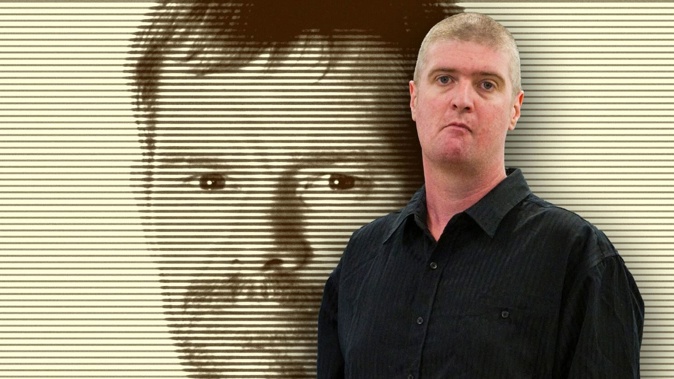
A meth cook who murdered an undercover police officer has been released from prison after 17 years behind bars.
In 2008, John Ward Skinner was suspected of manufacturing the Class-A drug and under investigation by the Auckland police drug squad.
It was supposed to be a simple job for Sergeant Don Wilkinson and his undercover team: Plant a tracking device on Skinner’s grey Ford Explorer parked outside his home in south Auckland.
As an electronics expert with the secretive Technical Support Unit, Wilkinson had completed this sort of task countless times. But in the early hours of 11 September 2008, it all went horribly wrong.
Dressed in dark clothing and hiding in the shadows of the driveway, Wilkinson and his partner were unaware they were under surveillance by CCTV cameras at Skinner’s rental home in Mangere.
Sprung by their target Skinner, and his associate Iain Clegg, the pair of police officers fled on foot. Both men ran towards the planned safety point, chosen in case the operation went south.
Skinner and Clegg, who later said they thought the officers were intruders trying to steal a car, chased them in Clegg’s Nissan Skyline.
Wilkinson, 46, was cornered in a driveway and shot at close range with a high-powered air rifle. He died at the scene.
His partner, who can only be known as Officer M, was shot multiple times but survived.
 Sergeant Don Wilkinson was shot dead while trying to plant a tracking device on the car of a suspected meth cook John Skinner. Photo / Richard Robinson
Sergeant Don Wilkinson was shot dead while trying to plant a tracking device on the car of a suspected meth cook John Skinner. Photo / Richard Robinson
After a jury trial in the High Court at Auckland in 2010, Clegg was acquitted of murder but convicted of manslaughter and received an eight-year sentence.
Skinner was convicted of assault, murder and attempted murder.
He was 38-years-old at the time and sentenced to life with a minimum non-parole period of 15 years.
In a separate trial, Skinner was convicted of possession of equipment and precursor materials used in the manufacture of methamphetamine.
Skinner became eligible for parole in 2024.
But despite acknowledging his positive progress, the Parole Board declined to release him on two occasions.
A year later, Skinner, now 54, reappeared before the Parole Board in August.
His lawyer Marie Dyhrberg KC highlighted his good behaviour over 10 years with no breaches of prison rules.
Skinner had also completed drug and alcohol treatment, five years of counselling with a private psychologist, and participated in the prison ‘work to release’ programme.
The Parole Board questioned Skinner about his quick relapse to criminal offending the last time he was released from prison.
Not long before shooting Don Wilkinson, Skinner had served a 4 ½ year prison sentence for manufacturing methamphetamine.
“He acknowledged that he has spent a life living a double existence,” the Parole Board said.
“He returned to using and manufacturing methamphetamine very quickly on parole.
“He said today that things would be different this time around given the treatment he has completed. He said he is a different man now.”
 Ian Lindsay Clegg, left, and John Ward Skinner at their trial in the High Court at Auckland in 2010. Photo /NZPA
Ian Lindsay Clegg, left, and John Ward Skinner at their trial in the High Court at Auckland in 2010. Photo /NZPA
Skinner received a positive report from prison staff, and was assessed by the psychologist as posing a low-risk of violent offending. He had a place to live and an offer of employment.
The Parole Board agreed to release Skinner in September under a number of strict conditions.
These include an electronically monitored curfew between 9pm and 6am at the approved address in Auckland, no drugs or alcohol, no contact with his co-offender, and ongoing counselling.
These conditions will remain in place for life and any breaches will result in Skinner being recalled to prison.
“This was very serious offending. We do think that, given his long history of offending, Mr Skinner will need to be carefully monitored on release,” the Parole Board said.
“However, we are satisfied that given the treatment that Mr Skinner has completed in prison, his release proposal … he will not pose an undue risk to the safety of the community if released on parole on tight conditions.”
Jared Savage covers crime and justice issues, with a particular interest in organised crime. He joined the Herald in 2006 and has won a dozen journalism awards in that time, including twice being named Reporter of the Year. He is also the author of Gangland, Gangster’s Paradise and Underworld.
Take your Radio, Podcasts and Music with you









